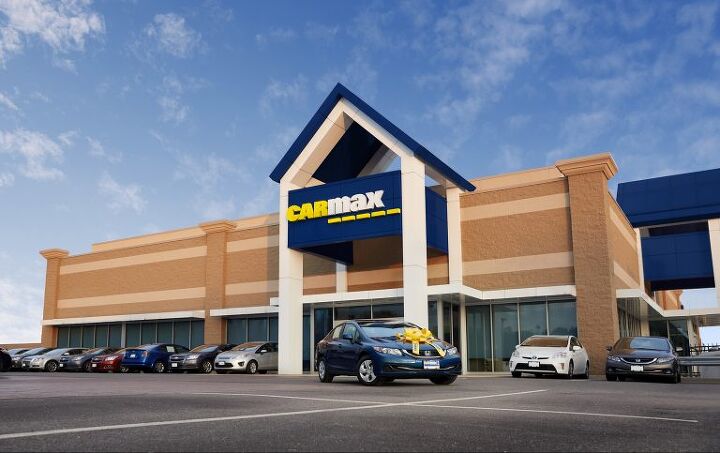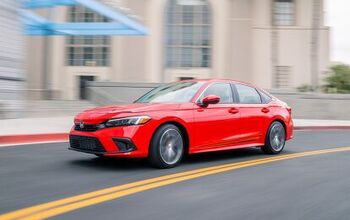A Quarter of the Vehicles Sold Through CarMax Had Unresolved Safety Issues, Study Claims

Over 25 percent of the used vehicles sold through eight CarMax locations in the United States had recall defects that were not addressed, according to a recent safety report.
The 2017 study, conducted by the Center For Auto Safety, the Consumers for Auto Reliability and Safety Foundation and the MASSPIRG Education Fund, noted that vehicles with unresolved safety recalls had more than doubled since 2015 at the five locations surveyed in both years. That is worthy of a raised eyebrow or two.
Questions remain, however. While the review cites numerous locations selling vehicles with what many would consider unacceptable issues, we don’t definitively know if this is indicative of CarMax as a whole. But lets face it, there were 64 million vehicles recalled for safety problems last year — exceeding the total for the previous three years combined.
That said, consumers should not be sold vehicles with outstanding recalls without being informed in advance. While CarMax does provide an “AutoCheck” report and the option to go over VIN-specific recalls with a sales associate, it’s not obligatory for customers to pay attention. Likewise, the report may not include any recall information outright.
Brought to our attention by Jalopnik, the study states that at least 45 of the 1,699 vehicles surveyed contained recalled Takata airbags, which have been attributed to 16 deaths and countless injuries. That’s a little less forgivable than a loose seat or faulty drink holder, despite the recall’s massive scale.
Dealers passing off lemons as quality automobiles isn’t an uncommon practice but CarMax presents itself differently than your average no-title-no-problem sketch artist. Its recent influx of duds could be attributed to the abnormally high number of recalls within the automotive industry. Honestly, we’d have been surprised if the research found fewer cars with outstanding problems this year.
Of the sample, 461 cars contained some unresolved issue — which accounted for 27 percent of all vehicles currently for sale between the eight locations. Those would be poor marks even if the study was intentionally choosing bad apples, however, the report doesn’t go into great detail about its methodology. Assumedly, it wanted to look into the five previously selected sites and picked the other three out of convenience.
Here are the shops in question, in case you were curious: In Massachusetts we have CarMax of North Attleboro, Danvers, Norwood, and Westborough. California locations included Oxnard and Sacramento South, and Connecticut’s East Haven and Hartford were also part of the study.
All of the cars in the sample were individually assessed based on the inventory available through the CarMax website and are available in the full report.
CarMax issued a response to the study, saying it “provides the most transparent and integrity-driven car buying experience in the industry. Our approach to recalls is no different. CarMax has led the industry in recall transparency and shares vehicle specific recall information in-store and online.”
It then went on to provide a link to the National Highway Traffic Safety Administration recall lookup website, with the VIN pre-populated, allowing customers to obtain open recall information on any used vehicle for sale. This is true and incredibly easy for anyone with thirty seconds to spare.
Finally, customers are required sign a form acknowledging the NHTSA recall information prior to signing sales documents. At this point, whether or not they actually did kind of doesn’t matter because the legal burden is off the seller.
Sure, we’d love to see CarMax taking care of problems prior to sale and shouting out recall details to unaware consumers. But they’re operating within the boundaries of the law and giving shoppers the tools necessary to make informed decisions — if they are willing to take advantage of them.
The only serious issue we see is that some CarMax locations seem to be more willing to take on a sketchier inventory. In which case, buyer beware. Of course, if you do hate your purchase the company does offer a five-day money-back guarantee.

A staunch consumer advocate tracking industry trends and regulation. Before joining TTAC, Matt spent a decade working for marketing and research firms based in NYC. Clients included several of the world’s largest automakers, global tire brands, and aftermarket part suppliers. Dissatisfied with the corporate world and resentful of having to wear suits everyday, he pivoted to writing about cars. Since then, that man has become an ardent supporter of the right-to-repair movement, been interviewed on the auto industry by national radio broadcasts, driven more rental cars than anyone ever should, participated in amateur rallying events, and received the requisite minimum training as sanctioned by the SCCA. Handy with a wrench, Matt grew up surrounded by Detroit auto workers and managed to get a pizza delivery job before he was legally eligible. He later found himself driving box trucks through Manhattan, guaranteeing future sympathy for actual truckers. He continues to conduct research pertaining to the automotive sector as an independent contractor and has since moved back to his native Michigan, closer to where the cars are born. A contrarian, Matt claims to prefer understeer — stating that front and all-wheel drive vehicles cater best to his driving style.
More by Matt Posky
Latest Car Reviews
Read moreLatest Product Reviews
Read moreRecent Comments
- ToolGuy I could go for a Mustang with a Subaru powertrain. (Maybe some additional ground clearance.)
- ToolGuy Does Tim Healey care about TTAC? 😉
- ToolGuy I am slashing my food budget by 1%.
- ToolGuy TG grows skeptical about his government protecting him from bad decisions.
- Calrson Fan Jeff - Agree with what you said. I think currently an EV pick-up could work in a commercial/fleet application. As someone on this site stated, w/current tech. battery vehicles just do not scale well. EBFlex - No one wanted to hate the Cyber Truck more than me but I can't ignore all the new technology and innovative thinking that went into it. There is a lot I like about it. GM, Ford & Ram should incorporate some it's design cues into their ICE trucks.


































Comments
Join the conversation
I once saw a 2016 XC90 that was for sale on Carmax but was a rebuilt from an accident in which all the air bags deployed. https://www.copart.com/lot/30648907/Photos http://web.archive.org/web/20170929170531/https://www.copart.com/lot/30648907/Photos carmax stock #14864567 https://www.google.com/search?q=https%3A%2F%2Fwww.carmax.com%2Fcar%2F14864567&oq=https%3A%2F%2Fwww.carmax.com%2Fcar%2F14864567 yes, that very car was being sold at CarMax with no rebuilt title.
My issue with CarMax is that there prices are as high or higher than any other dealer and they won't budge when you point that out. To me this isn't no haggle but rather shut up and pay what we are asking. I can walk into any dealer and fork over the asking price and get a similar deal. If you like shopping there cool, but I just don't see the allure.